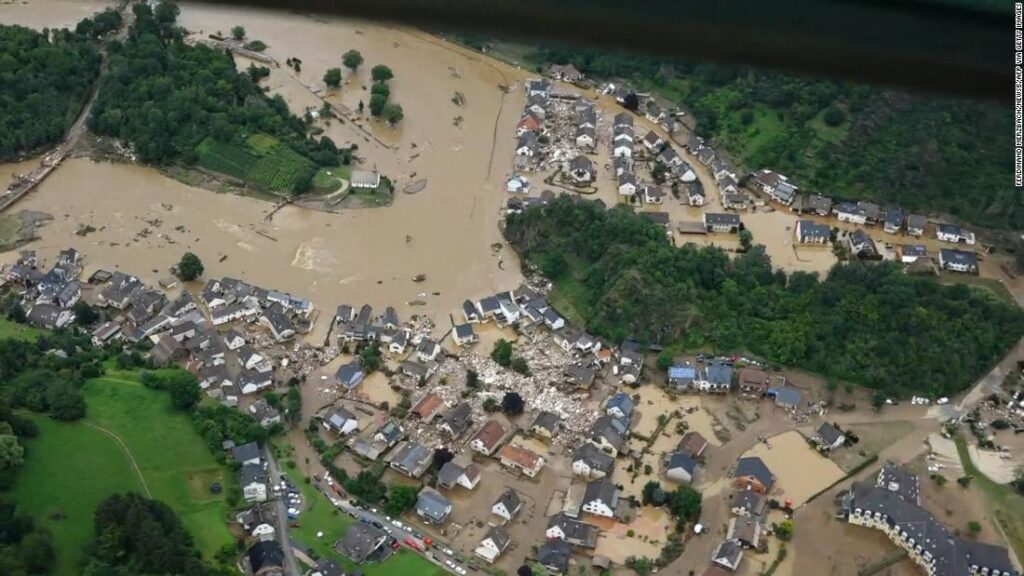Cloud Wars

Germany and Mother Nature Clash
On an otherwise uneventful midsummer Friday evening across Germany’s northwestern Rhine-Palatinate and North Rhein Westphalia heartland, sudden torrential downpours transformed the normally-placid confluence of the mid-size Ahr and Trierbach Rivers into an exploding aquatic maelstrom. Ultra-rapidly rising water levels engulfed slumbering villages in a watery death unseen in 500-1,000 years of European Flooding History. Mother Nature overwhelmed Germany in what seemed nothing short of a ‘Cloud War’. In the space of only a few hours, over 100 Germans lost their lives and well over 1,300 remain unaccounted for — an embarrassing ‘natural-event emergency response’ statistic for one of the world’s most sophisticated industrial powers.
Germany’s meticulously-designed weather-warning and river-level monitoring systems functioned as designed. They warned, and usually in an adequate period of time, as set forth in countless models designed over past years by top-tier European meterological experts. Sirens and mass media effectively-communicated the impending calamity to the population. However, the problem was not in recognition of an impending mass-scale weather event, or even in the ability to get the warning out to the local population. The problem was with the ability to act and ameliorate the situation in real-time.
In short, a modern industrialized nation-state could not instantaneously-cope with the intensity of the downpour — one square meter of ground acreage was struck by 70L of rainwater in the space of two to three hours. Even for a modern and well-designed runoff system dating back to the Middle Ages, it was too much excess water volume for both the rural forested and suburban terrains to absorb at too alarming a rate. Within two hours or less, water levels throughout small towns rose 12-18 feet above their adjacent river banks, and hundreds of residents in each of a multitude of small towns were entrapped on the top floors of their offices and residences.
In the village of Müsch, with a population of 200 — houses, cars, furniture, street pavement, trees and large boulders were simply swept away. In some areas, the deluge was over in a mere four hours but the devastation was insurmountable. Not far from Müsch, the banks of the Kyll River overswept their dikes so rapidly, that all usual measures for flood containment were overcome in a matter of minutes.
The speed and volume of rising and engulfing waters overwhelmed the usually well-designed German emergency response system, which collapsed under the onslaught in a War with the Clouds. Mother Nature won — Germany Lost. Countless smaller rivers and their tributaries were never designed by nature to handle this amount of excess water in such a short period of time, with many tributary watersheds encountering maximum levels of water height previously unrecorded in German history.
Some communities fared better than others. On the banks of the larger Wupper River, the warning and water diversion systems functioned more effectively. In spite of property damage, there were no fatalities. However, in other towns, most smaller communities in the region such as in the Rheinland-Palatinate’s Ahrweiler District, residents were warned of rising flood levels, but a state of emergency was not declared until it was too late — in one instance, 12 elderly, handicapped residents of a care home in Sinzig were unable to move to higher floors and perished.
In neighboring Belgium, the floods wreaked havoc, but left lower levels of casualties in their wake. With lake levels rising as far to the south as Switzerland, the German Federal Weather Service alerted to the possibility of downpours and impending floods in the neighboring Eifel and Mosel regions to the south, as well as significantly-further southwest toward the German region of Baden-Württenberg, adjacent to the Swiss border.
All in all, the German government’s role in this flash crisis was not spotless. With recognition that merely negotiating carbon credits and enacting green environmental programs for world climate change didn’t cut it at a local level, and doubtless with upcoming elections looming in Germany this fall, there will be a political price to pay.
Historically throughout post WW II German election history, the impact of weather events and natural disaster response has played negatively on the prospects of the political party in power, in this case Angela Merkel’s conservative ruling party — which also controls the state governments of North-Rhine Westphalia, and its leader Armin Laschet, who acknolwedged that: in the wake of a lesson learnt from the catastrophic and historic flood-of-a-century, Germans needed to “make the state more climate-proof and to make Germany climate neutral even faster”.
His comments notwithstanding, Laschet was unclear as to how this would have made a difference against flood levels never before recorded in German history. Doubtless, the opposition Green Party will pounce on Mr. Laschet’s comments, as he stands for election on Sept 26, in a bid to succeed Angel Maerkel as Chancellor of Germany.
Julia Mineeva/Thenews2







